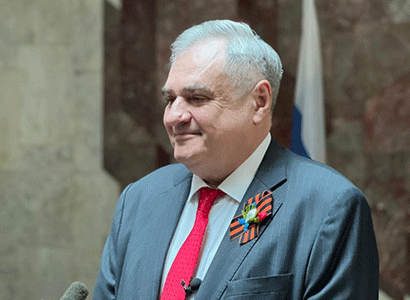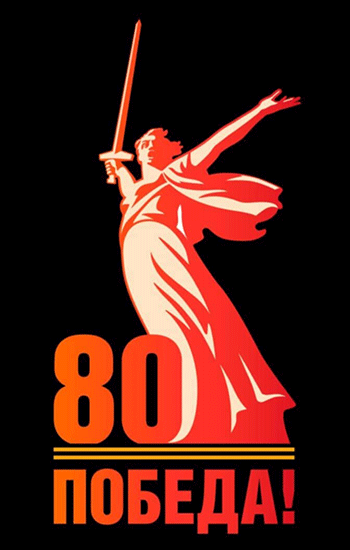 |
| Vladimir Kalinin. |
The 80th anniversary of the great victory
The Great Patriotic War has left a deep mark in the hearts of many millions of people. It began on June 22, 1941, when Hitler’s Germany treacherously attacked the Soviet Union at dawn. Despite the Non-aggression pact signed in August 1939, Hitler, who came to power, moved the troops of the Third Reich to the east to wipe our country off the map. After that, there were 1,418 days of the hardest struggle, which was selflessly fought and ended with a Great Victory by our great-grandfathers, grandfathers, fathers, their wives and children of the war.
During the first months of the war, the Soviet troops suffered huge losses and abandoned large territories. But the enemy also faced tremendous losses, which he had not experienced yet during successful blitzkriegs on the western front.
One of the turning points of the initial period of the war was the defense of Moscow in the autumn of 1941. The Battle for Moscow became the first strategic victory of the Red Army, disrupted Hitler’s plans for a lightning fast war and encouraged the entire Soviet people to continue fighting against the enemy.
An important milestone in the history of the Great Patriotic War was the Battle of Stalingrad, which began on July 17, 1942. Stalingrad became the beginning of a fundamental change in the war and the place where its fate was decided.
In January 1943 an another significant event has happened – the breaking of the blockade of Leningrad; in February, Kursk was liberated; and in July 1943, the Battle of Kursk became one of the largest tank battles in history, the victory in which allowed the Red Army to finally take away the strategic initiative.
 |
| Vladimir Kalinin. |
As the Soviet troops moved to the west, they liberated the occupied territories, bringing hope and joy to the local people. In autumn the battle for Dnipro was over, and Donetsk and Novorossiysk were liberated by the end of the year. In spring the Red Army troops have expelled the fascists from Odessa, Crimea and Sevastopol.
At the end of June the famous strategic offensive operation “Bagration” was launched, which led to the liberation of Belarus, Moldova, the Baltic States, and then – the European countries: Yugoslavia was liberated from the German-fascist occupation, Romania and Bulgaria – from the Hitler’s accomplices, who were in power in these countries. That year ended with the entry of the Red Army units into Czechoslovakia and Hungary, and the Soviet troops continued their offensive operation: Warsaw was liberated in January 1945, Budapest – in February, and Bratislava and Vienna were freed in April. During this period the Soviet troops defeated the fascists in Konigsberg. As a result of fierce fighting at the end of April, the Banner of Victory was raised over the Reichstag, in early May the Berlin enemy grouping was crushed, and on May 8 (May 9, Moscow time), Germany signed an Act of its unconditional surrender to the USSR and the countries of the Anti-Hitler Coalition. Since then, – 9th of May has been celebrated as the end of the Great Patriotic War and our Great Victory!
The consequences of World War II were also experienced by Lao people, who were under the occupation of an external aggressor – the French colonial Vichy government and later–militarist Japan, the defeat of which gave an impetus to the national liberation movement in Laos.
As an outcome of that terrible war became the worldwide recognition of the courage commitment and indomitable will of the Soviet people. And this day will forever remain a commemoration day of gratitude to all those who gave their lives for our peaceful future, who returned to their Fatherland with Victory, and who strived days and nights at the home fronts to bring Victory closer.
And today, when fascism and neo–Nazism emerge again in certain parts of the world, we honour the memory of the Soviet soldier, who has not only liberated his native land from the Nazis, but also provided the people of European countries, that were occupied or subjugated by the dictatorship, with a chance to survive and maintain their national sovereignty and independence. The Soviet soldiers have saved the world, and it is no coincidence that at the plenary meeting of the 79th Session of the UN General Assembly held on March 7, 2025, the Resolution on the “80th Anniversary of the end of the Second World War” was passed by consensus and was co-authored by 54 countries from all over the world, including the Lao PDR.
The text of the document contains a reminder that it was the end of the Second World War that created the conditions for the establishment of the United Nations Organisation. The Member States are urged to join efforts to combat challenges and threats to international peace and security with the central role of this world Organisation. The adoption of the Resolution is a commemoration to the heroes, who fought against Nazism, fascism, and Japanese militarism, as well as to the multimillion civilian victims.
And when on May 9 in the presence of the leaders of a number of countries, including a high-ranking delegation from the Lao PDR, the columns of military units, including Lao soldiers, will march at the Red Square parade in Moscow, we will remember all those who gave their lives for our peaceful future, who returned to their Fatherland with Victory, and who gave to all mankind the ability to release from the evil forces. Happy Great Victory Day!
--Source: Ambassador Extraordinary and Plenipotentiary of the Russian Federation to the Lao PDR Vladimir Kalinin
By Times Reporters
(Latest Update May 8, 2025)
|



